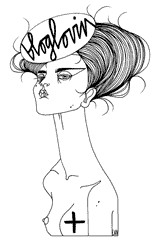After Midnight by Irmgard Keun
26 November, 2012
Why does a girl like Gerti have to go falling in love with a banned person of mixed race, for goodness’ sake, when there are plenty of men around the authorities would let her love? … Before you know it, you may find yourself castrated or in prison, which is not pleasant.
Set in 1930s Frankfurt on the eve of World War II, nineteen year old Sanna is desperately trying to understand her dramatically changing world. Caught between adulthood, love and ever-growing threat of National Socialism, Irmgard Keun paints a portrait of daily life in Germany in After Midnight as the spectre of Nazi control and war draws near.
What is clever about Keun’s novel is that it is set before Hitler wields total control. This is the period when people are just beginning to realise the severity of their social situation, still toying with the notion on informing on their neighbours, saluting the Nazis and openly voicing dissent. As they begin to realise that their actions may have severe consequences, Sanna and her friends slowly begin to feel the tight stranglehold of the autocratic state.
The thing that tempers this growing fear is Sanna’s naïve and yet piercing observations of the people and situations in which she finds herself. For example,
I’ve often noticed how pleased and proud men are at having to knock in a certain way at the doors of perfectly harmless pubs, in order to get in. I expect there are some men who take to politics just for the sake of the secret signals you have to give.
Still nineteen, her thoughts are occupied by Franz, her lover whom she left behind in her home town with his cold, heartless mother. Sanna is staying with her cousin Algin, a famous novelist who is now blacklisted, and his beautiful wife Liska, who is in love with a jaded journalist named Heini. Their circle of friends is bohemian and mixed, an increasingly dangerous cocktail as stringent racial laws are passed. It is a damning time, and yet Sanna sees the absurd and comic side of life, especially the doomed love affair between her friend Gerti and mixed-race Dieter Aaron whose Jewish father is all for the National Socialists.
And then the pair of them sit in a bar looking at each other, the air around them positively quivering with love-sickness. Everyone in the bar must notice; no good can come of it. They just live for the moment, and cause the air to quiver, and don’t stop to wonder what next…
Sometimes I keep them company, so that the impression they make in the bar won’t be quite so dangerous.
But as things grow more tense, Sanna finds herself in a quandary when Franz turns up a hunted man and must make a decision about her future.
After Midnight is a stark yet comic portrayal of a Germany being devoured by the Nazi ideology. But Keun manages to keep the tone light, the novel itself retaining a dream-like quality in a fin-de-siècle style. With hindsight, the reader can see the ever-growing traps laid out for the people, but the people of Frankfurt are bumbling from one trap to another, denouncing their neighbours and friends in an increasingly vicious cycle, unaware of their own doom. It’s a sad testament to the nature of humanity but the absurdity of it all drives home the very human-ness that is being suppressed.
Take the story of little Berta, chosen to present flowers to the Führer on his visit to Frankfurt. Her parents her decked her out in finery, ordered a bouquet of lilac from Nice and her father has composed a poem especially for the occasion for her to recite. But the parade is mistimed and Berta misses her chance, reciting her poem in the pub afterwards, and promptly falls down dead from an allergic reaction to the flowers or a fever. Amidst the chaos and tragedy is the seed of absurdity and you can’t help but see Keun’s genius.
Although I can’t describe After Midnight as a thrilling read, it’s one filled with succinct observations and humour which, on careful thought, may be a little too mature for a nineteen year old. Not much happens and yet Keun’s beautiful prose and excellent translation by Anthea Bell made me reluctant to put the book down. A small book with a big punch indeed.
And don’t you just love the beautifully simple cover by Melville House?
I read this as part of German Literature Month hosted by Lizzy and Caroline.













26 November, 2012 at 9:01 pm
I am so glad I saw this post. This book and this author sound so interesting. I am going to add this to my wishlist.
29 November, 2012 at 12:26 pm
The story only happens over a couple of days (I think) but the observations are acutely funny and brilliant. I hope you do read it!
27 November, 2012 at 10:00 am
German-language books set in the late 20s and early 30s are fascinating because of the knowledge we have of what came next. For me, they’re far more interesting than the plethora of WW2 books out there 🙂
29 November, 2012 at 12:27 pm
There is something about reading about daily life that is so fascinating probably because we can compare with ours. But yes, I agree:)
28 November, 2012 at 12:57 pm
I’m so glad you liked it. I like Irmgard Keun’s voice a lot. She was a very perceptive writer, no wonder she had to flee very early.
I’ve read The Artificial Silk Girl and just loved it.
29 November, 2012 at 12:28 pm
She doesn’t exactly mince her words, does she? Some of her observations in her book are biting indeed. I think you recommended this book in one of your posts last year, so thank you!
29 November, 2012 at 5:39 am
[…] After Midnight by Irmgard Keun (chasing bawa) […]
15 December, 2012 at 11:07 am
[…] Piano Teacher (1), Wonderful, Wonderful Times (1) Kafka: Amerika (1) Keun: After Midnight (1) von Kleist: The Beggar Woman of Locarno (1) Ledig: The Stalin Front (1 2 3) Mann Heinrich: Man […]